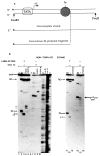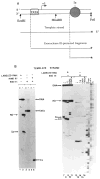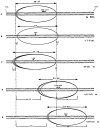Nascent RNA cleavage by arrested RNA polymerase II does not require upstream translocation of the elongation complex on DNA
- PMID: 7503982
- PMCID: PMC3373964
Nascent RNA cleavage by arrested RNA polymerase II does not require upstream translocation of the elongation complex on DNA
Abstract
Obstacles incurred by RNA polymerase II during primary transcript synthesis have been identified in vivo and in vitro. Transcription past these impediments requires SII, an RNA polymerase II-binding protein. SII also activates a nuclease in arrested elongation complexes and this nascent RNA shortening precedes transcriptional readthrough. Here we show that in the presence of SII and nucleotides, transcript cleavage is detected during SII-dependent elongation but not during SII-independent transcription. Thus, under typical transcription conditions, SII is necessary but insufficient to activate RNA cleavage. RNA cleavage could serve to move RNA polymerase II away from the transcriptional impediment and/or permit RNA polymerase II multiple attempts at RNA elongation. By mapping the positions of the 3'-ends of RNAs and the elongation complex on DNA, we demonstrate that upstream movement of RNA polymerase II is not required for limited RNA shortening (seven to nine nucleotides) and reactivation of an arrested complex. Arrested complexes become elongation competent after removal of no more than nine nucleotides from the nascent RNA's 3'-end. Further cleavage of nascent RNA, however, does result in "backward" translocation of the enzyme. We also show that one round of RNA cleavage is insufficient for full readthrough at an arrest site, consistent with a previously suggested mechanism of SII action.
Figures








Similar articles
-
A DNA minor groove-binding ligand both potentiates and arrests transcription by RNA polymerase II. Elongation factor SII enables readthrough at arrest sites.J Mol Biol. 1994 Feb 25;236(3):725-37. doi: 10.1006/jmbi.1994.1185. J Mol Biol. 1994. PMID: 8114090
-
Transcription factors TFIIF, ELL, and Elongin negatively regulate SII-induced nascent transcript cleavage by non-arrested RNA polymerase II elongation intermediates.J Biol Chem. 2001 Jun 22;276(25):23109-14. doi: 10.1074/jbc.M101445200. Epub 2001 Mar 19. J Biol Chem. 2001. PMID: 11259417
-
The RNA polymerase II elongation complex. Factor-dependent transcription elongation involves nascent RNA cleavage.J Biol Chem. 1992 Aug 5;267(22):15516-22. J Biol Chem. 1992. PMID: 1379232 Free PMC article.
-
Transcription elongation factor SII.Bioessays. 2000 Apr;22(4):327-36. doi: 10.1002/(SICI)1521-1878(200004)22:4<327::AID-BIES3>3.0.CO;2-4. Bioessays. 2000. PMID: 10723030 Free PMC article. Review.
-
The transition from initiation to elongation by RNA polymerase II.Cold Spring Harb Symp Quant Biol. 1998;63:289-300. doi: 10.1101/sqb.1998.63.289. Cold Spring Harb Symp Quant Biol. 1998. PMID: 10384293 Review. No abstract available.
Cited by
-
Characterization of a novel RNA polymerase II arrest site which lacks a weak 3' RNA-DNA hybrid.Nucleic Acids Res. 2004 Mar 26;32(6):1904-16. doi: 10.1093/nar/gkh505. Print 2004. Nucleic Acids Res. 2004. PMID: 15047857 Free PMC article.
-
The Xenopus 9 bp ribosomal terminator (T3 box) is a pause signal for the RNA polymerase I elongation complex.Nucleic Acids Res. 1995 Jun 25;23(12):2252-8. doi: 10.1093/nar/23.12.2252. Nucleic Acids Res. 1995. PMID: 7541911 Free PMC article.
-
Domain acquisition enabled functional expansion of the TFIIS transcription factor family.Cell Biosci. 2025 Jun 4;15(1):78. doi: 10.1186/s13578-025-01423-9. Cell Biosci. 2025. PMID: 40468406 Free PMC article. Review.
-
G4-forming sequences in the non-transcribed DNA strand pose blocks to T7 RNA polymerase and mammalian RNA polymerase II.J Biol Chem. 2008 May 9;283(19):12756-62. doi: 10.1074/jbc.M705003200. Epub 2008 Feb 20. J Biol Chem. 2008. PMID: 18292094 Free PMC article.
-
Ouabain-Induced Changes in the Expression of Voltage-Gated Potassium Channels in Epithelial Cells Depend on Cell-Cell Contacts.Int J Mol Sci. 2022 Oct 31;23(21):13257. doi: 10.3390/ijms232113257. Int J Mol Sci. 2022. PMID: 36362049 Free PMC article.
References
Publication types
MeSH terms
Substances
Associated data
- Actions
Grants and funding
LinkOut - more resources
Full Text Sources
Other Literature Sources
Miscellaneous

